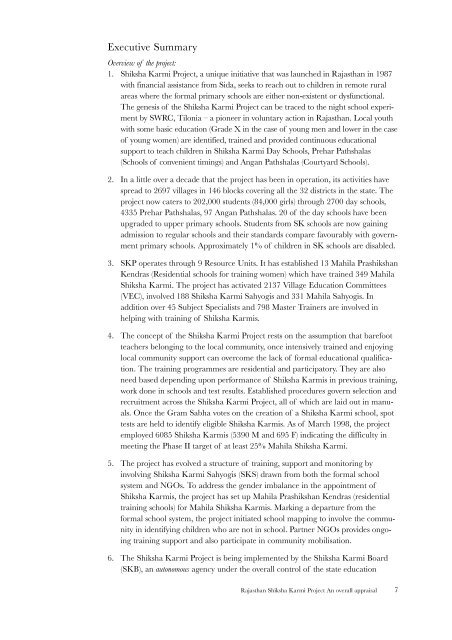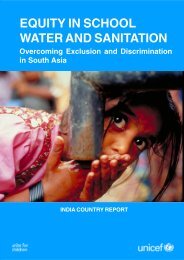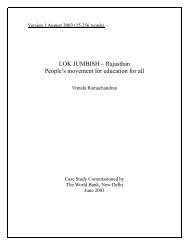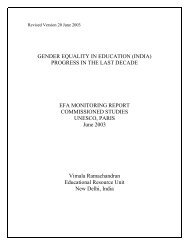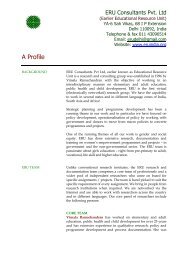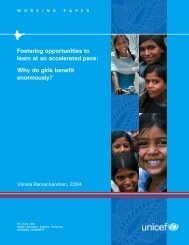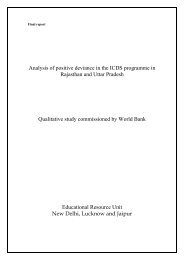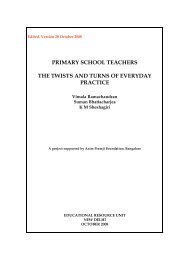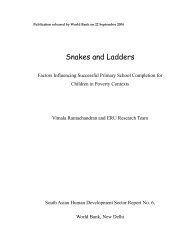Rajasthan Shiksha Karmi Project An overall appraisal
Rajasthan Shiksha Karmi Project An overall appraisal
Rajasthan Shiksha Karmi Project An overall appraisal
You also want an ePaper? Increase the reach of your titles
YUMPU automatically turns print PDFs into web optimized ePapers that Google loves.
Executive SummaryOverview of the project:1. <strong>Shiksha</strong> <strong>Karmi</strong> <strong>Project</strong>, a unique initiative that was launched in <strong>Rajasthan</strong> in 1987with financial assistance from Sida, seeks to reach out to children in remote ruralareas where the formal primary schools are either non-existent or dysfunctional.The genesis of the <strong>Shiksha</strong> <strong>Karmi</strong> <strong>Project</strong> can be traced to the night school experimentby SWRC, Tilonia – a pioneer in voluntary action in <strong>Rajasthan</strong>. Local youthwith some basic education (Grade X in the case of young men and lower in the caseof young women) are identified, trained and provided continuous educationalsupport to teach children in <strong>Shiksha</strong> <strong>Karmi</strong> Day Schools, Prehar Pathshalas(Schools of convenient timings) and <strong>An</strong>gan Pathshalas (Courtyard Schools).2. In a little over a decade that the project has been in operation, its activities havespread to 2697 villages in 146 blocks covering all the 32 districts in the state. Theproject now caters to 202,000 students (84,000 girls) through 2700 day schools,4335 Prehar Pathshalas, 97 <strong>An</strong>gan Pathshalas. 20 of the day schools have beenupgraded to upper primary schools. Students from SK schools are now gainingadmission to regular schools and their standards compare favourably with governmentprimary schools. Approximately 1% of children in SK schools are disabled.3. SKP operates through 9 Resource Units. It has established 13 Mahila PrashikshanKendras (Residential schools for training women) which have trained 349 Mahila<strong>Shiksha</strong> <strong>Karmi</strong>. The project has activated 2137 Village Education Committees(VEC), involved 188 <strong>Shiksha</strong> <strong>Karmi</strong> Sahyogis and 331 Mahila Sahyogis. Inaddition over 45 Subject Specialists and 798 Master Trainers are involved inhelping with training of <strong>Shiksha</strong> <strong>Karmi</strong>s.4. The concept of the <strong>Shiksha</strong> <strong>Karmi</strong> <strong>Project</strong> rests on the assumption that barefootteachers belonging to the local community, once intensively trained and enjoyinglocal community support can overcome the lack of formal educational qualification.The training programmes are residential and participatory. They are alsoneed based depending upon performance of <strong>Shiksha</strong> <strong>Karmi</strong>s in previous training,work done in schools and test results. Established procedures govern selection andrecruitment across the <strong>Shiksha</strong> <strong>Karmi</strong> <strong>Project</strong>, all of which are laid out in manuals.Once the Gram Sabha votes on the creation of a <strong>Shiksha</strong> <strong>Karmi</strong> school, spottests are held to identify eligible <strong>Shiksha</strong> <strong>Karmi</strong>s. As of March 1998, the projectemployed 6085 <strong>Shiksha</strong> <strong>Karmi</strong>s (5390 M and 695 F) indicating the difficulty inmeeting the Phase II target of at least 25% Mahila <strong>Shiksha</strong> <strong>Karmi</strong>.5. The project has evolved a structure of training, support and monitoring byinvolving <strong>Shiksha</strong> <strong>Karmi</strong> Sahyogis (SKS) drawn from both the formal schoolsystem and NGOs. To address the gender imbalance in the appointment of<strong>Shiksha</strong> <strong>Karmi</strong>s, the project has set up Mahila Prashikshan Kendras (residentialtraining schools) for Mahila <strong>Shiksha</strong> <strong>Karmi</strong>s. Marking a departure from theformal school system, the project initiated school mapping to involve the communityin identifying children who are not in school. Partner NGOs provides ongoingtraining support and also participate in community mobilisation.6. The <strong>Shiksha</strong> <strong>Karmi</strong> <strong>Project</strong> is being implemented by the <strong>Shiksha</strong> <strong>Karmi</strong> Board(SKB), an autonomous agency under the <strong>overall</strong> control of the state education<strong>Rajasthan</strong> <strong>Shiksha</strong> <strong>Karmi</strong> <strong>Project</strong> <strong>An</strong> <strong>overall</strong> <strong>appraisal</strong>7


